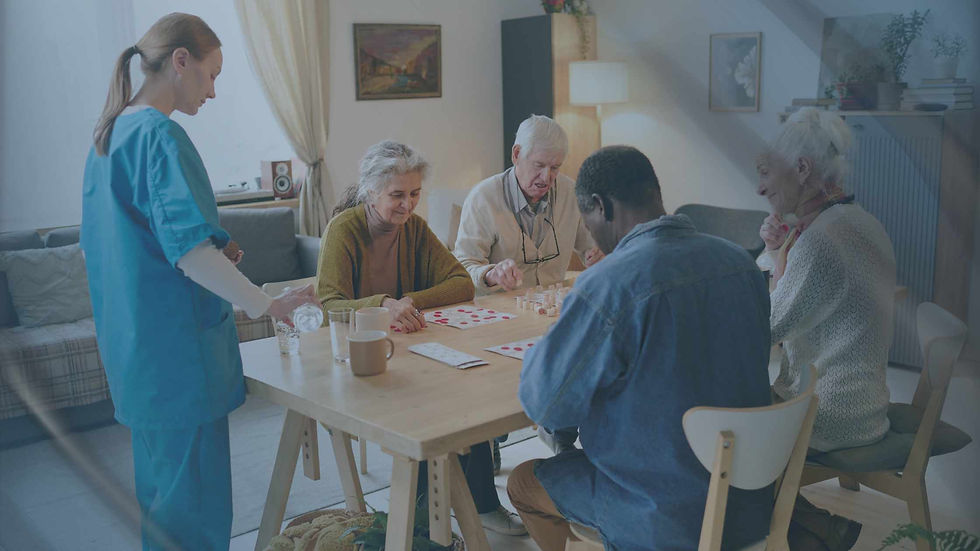What to Know About Falls in Nursing Homes: Legal Responsibilities and Resident Safety
- Fiffik Law Group, PC

- Aug 7, 2024
- 4 min read

Falls are the leading cause of injury among nursing home residents, often resulting in severe consequences that impact both health and quality of life. For most people, a fall might sound like no big deal, but for an elderly person it can lead to significant health issues such as fractures, reduced mobility, and in some cases, even death. For families navigating the aftermath of a fall in a nursing home, understanding the legal implications and available recourse is crucial.
The Reality of Falls
Falls are extremely common for residents in long-term care. At least half of elderly nursing home residents experience a fall each year and that figure would be higher if many residents were not bed bound. Good facilities study individual falls, fall rates, locations of the falls, timing of the falls, etc. They seek to understand how to take a micro and macro approach to minimize the chance of a fall in the future.
Extrinsic Causes of Falls
Falls are attributed to either extrinsic or intrinsic causes. The most common extrinsic causes have to do with the resident’s environment. Perhaps the furniture is in an awkward spot or there’s simply too much of it. Taking a trip to the bathroom at 2 AM and navigating between the reclining chair, tray table and lamp can cause a moment’s unsteadiness and a fall. A younger person would be able to right themselves but for an older person, being just a bit off-kilter will likely result in a fall. Residents with dementia might not be able to perceive wet floors or read signs in the hallway and unwittingly walk into a dangerous spot. The list of extrinsic causes is long.
Intrinsic Causes of Falls
The first order of business is to be sure your loved one is falling and not fainting or having a seizure. Fainting is most common in people with heart or blood pressure problems. Low blood pressure can be caused by a wide variety of medications commonly taken by the elderly. Dehydration is another common cause. Once fainting and seizures are eliminated, you can move on to other possibilities such as neurological disorders. Parkinson’s disease classically affects balance and gait. Alzheimer’s disease in its later stages results in perception, balance, gait and other behavioral issues that can cause falling. Joint disease often leads to falls. Determining the cause can require a fair bit of sleuthing.
Nursing Homes' Duty to Prevent Falls
Nursing homes have a legal duty of care to provide a safe environment and to implement measures that prevent falls. This duty includes:
Assessing Fall Risk
Nursing homes must regularly assess each resident’s risk of falling and implement personalized strategies to mitigate these risks.
Providing Mobility Aids
Facilities are required to ensure that residents have access to walkers, canes, and other mobility aids as needed. If falling at night is a problem, lower beds are an option.
Maintaining Safe Pathways
Common areas and hallways should be kept free of obstacles, and proper lighting must be ensured to reduce fall risks.
Use of Bed Rails and Physical Restraints
Historically, restraints such as belts, vests, bed rails, and specialized chairs were used to prevent falls. However, recent research has shown that these restraints do not effectively prevent injury and may even increase the likelihood of injury from residents trying to escape their restraints. They may also pose additional risks such as reduced mobility and psychological distress.
Alternatives to Restraints: In nursing homes, the rules for restraints are fairly clear. They may be used once all other reasonable alternatives have failed. Most states require staff to foster the “highest practicable” level of independence. Here are some modalities that you should expect your loved one’s home to try before using restraints:
Increased Supervision: More frequent checks and assistance from staff.
Environmental Modifications: Adjustments to the living space to make it safer, such as lower beds, non-slip mats, and adequate lighting.
Assistive Devices: Ensuring mobility aids are within reach and used appropriately.
Individualized Care Plans: Tailoring care plans to each resident’s needs and capabilities.
Legal Recourse When a Resident Falls
When a resident falls, determining liability can be complex. The nursing home may be held liable if they fail to meet their duty of care. However, there are circumstances where liability may not be straightforward:
Compliance with Safety Measures
If a resident is non-compliant—for example, failing to use a walker when instructed—the nursing home must still demonstrate that reasonable measures were taken to ensure their safety. This includes regularly reminding the resident and monitoring their adherence to safety protocols.
Proof of Negligence
To prove negligence, it must be shown that the nursing home failed to provide adequate care or failed to follow their own policies, resulting in the fall and subsequent injury. This includes documenting the resident’s condition, communications with the nursing home, and any deviations from established care plans.
Beyond negligence, a nursing home may also be liable for:
Abuse: Physical, emotional, or sexual abuse.
Violation of Residents' Rights: Failure to respect the rights of residents, including a safe environment and adequate care.
Breach of Contract: Failing to meet terms outlined in a contract or agreement.
Failure to Follow Regulations: Non-compliance with federal and state regulations.
Medical Malpractice: Improper medical treatment or medication errors.
Gross Negligence: Extreme recklessness or carelessness.
Falls in nursing homes can be serious and often indicate a lapse in care. If your loved one has suffered a fall, understanding their rights and seeking legal recourse is essential. Document everything and consult with an attorney who specializes in nursing home abuse and neglect to explore your legal options.
For more information or to discuss a potential claim, contact Fiffik Law Group today. We are committed to advocating for the rights of nursing home residents and ensuring they receive the quality care they are entitled to by law.


